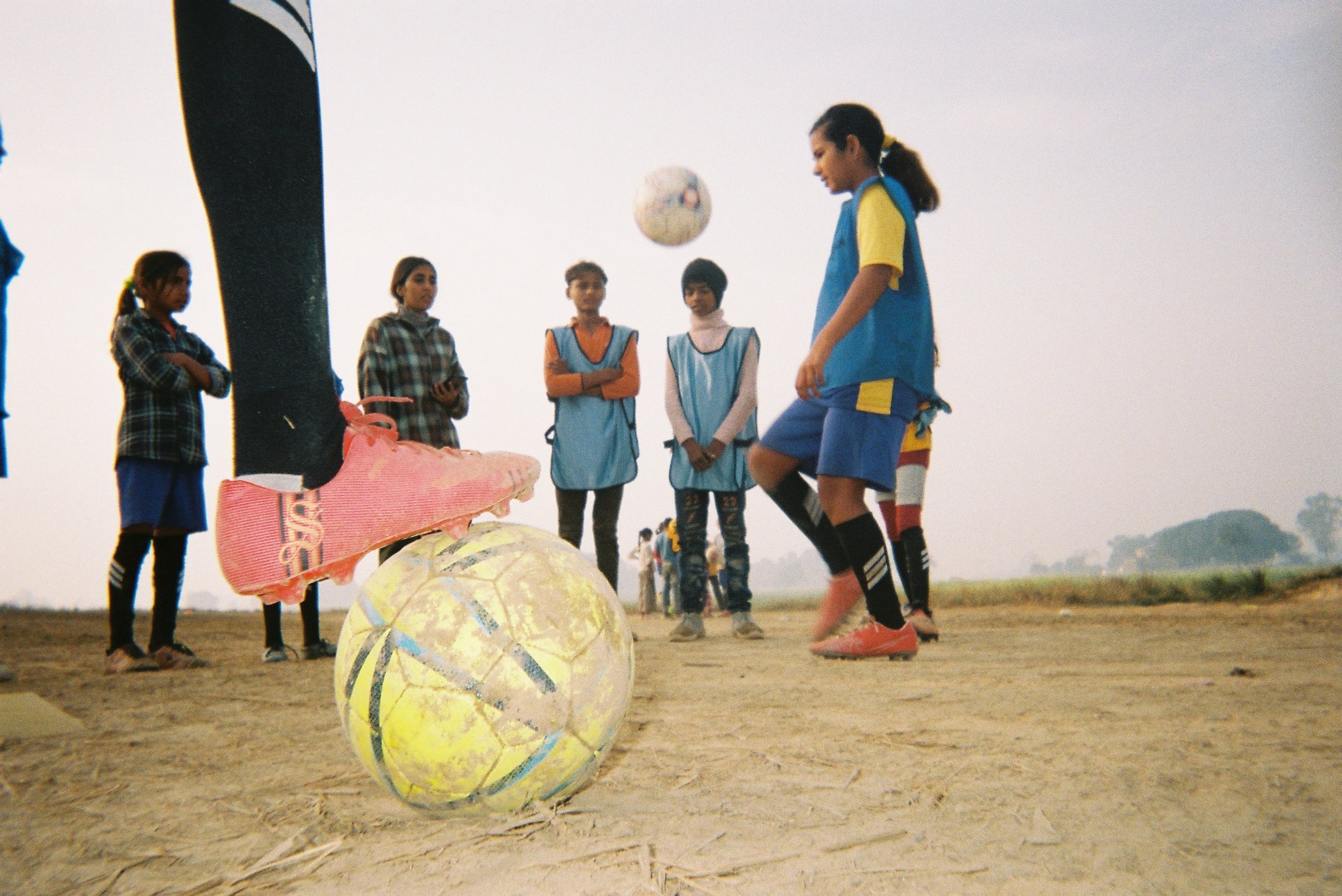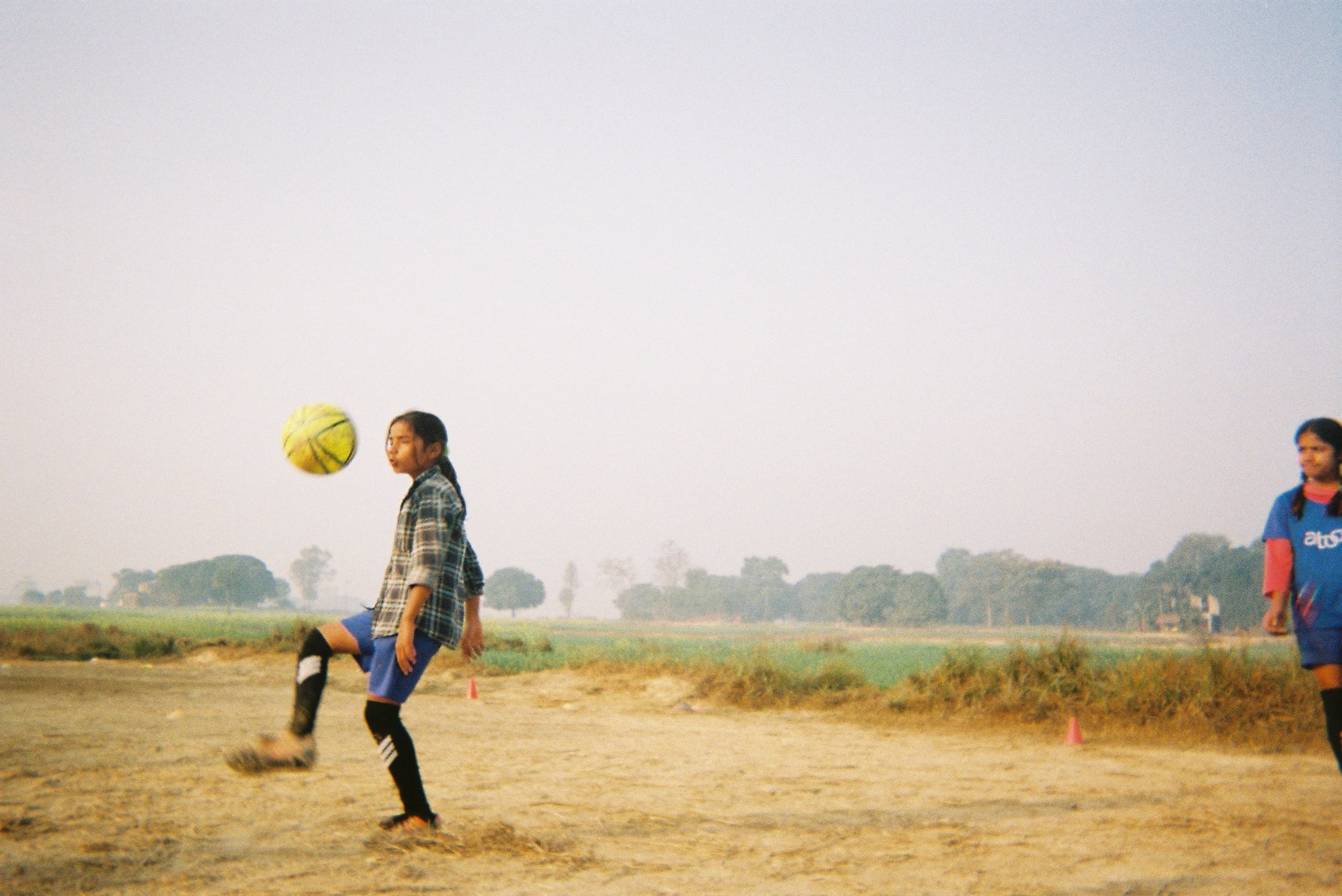Breaking Barriers, Scoring Goals
Monika Kumari, Nepal
Monika Kumari is a programme officer with Atoot, a football for good nonprofit based in the rural villages of south Nepal. Established in 2018, Atoot's mission is to provide equitable sporting and educational opportunities to marginalised Nepali girls. This includes daily football sessions, extra educational classes, and life skills workshops, enabling the girls to learn, develop, challenge norms and take ownership of their futures. Led by a team of young, local women, Atoot works with 250+ girls and 600+ community members.
Monika coaches football sessions, leads educational classes, life skills workshops, and community engagement, as well as being a mentor and role model to more than 250 girls. She has worked for Atoot for the past three years and is a former beneficiary of the Yuwa India program.
My name is Monika Kumari. I am currently working as a Programme Officer at Atoot in Nepal. When I was younger, I was a beneficiary of a sport for development program at an organisation called Yuwa in Jharkhand, India. That is where I started my football journey when I was 10 years old. It was at Yuwa that I met Atoot’s co-founders Sarah Van Vooren and Mashreeb Aryal. They were my teachers and coaches.
When I completed my 12th grade and graduated high school, I was looking for internship opportunities. Atoot was a strong option for me to do my internship, as right from the start I knew I wanted to work with girls. I knew the influence Yuwa and its program has had on me, helping me become more capable and self-assured. I wished to impart the same knowledge and skills to other girls.
I also belong to a marginalised community like the girls at Atoot and know the challenges they face, so I wanted to do something for these girls. I decided to join Atoot to empower girls through sport and education - by educating them about their rights and helping them to be more vocal.
What is Atoot’s program? What are some of the challenges the Atoot girls face?
Atoot is a non-profit organisation which educates and empowers marginalised, rural Nepali girls through sporting and educational opportunities. It focuses on long-term capacity building and holistic development of at-risk girls and their communities. Atoot’s work is based in Kapilvastu district, in the south of Nepal along the Nepal-India border. Atoot works with more than 250 girls between the ages of 4-17.
Some of the challenges Atoot girls and their communities face are child marriage, gender-based violence, early school dropouts, and the dowry system.
Girls’ education is systematically ignored in rural areas. Early school dropout is rampant among girls between grades 5 to 8. They work in servitude to their family, preparing to serve their future husband and his family. Even though the practice is illegal in Nepal, the dowry system is one of the most pressing issues girls face in the area Atoot works.
Girls are often isolated in their communities and given no decision making power. With all of the above issues girls face, they are in no position to fight or demand for their rights.
What did you try to show with the photos? Was there any wider meaning with the photos?
These are the girls of Atoot. The photos were all taken in Dohani village in Kapilvastu district, Nepal. The girls are showcasing their passion for football. Their commitment to football not only connects them as a group, but also motivates them to have a meaningful impact in society. Their passion for football is breaking down barriers and encouraging positive change in the community.
These girls demonstrate strength, teamwork, and being role models for other girls in the society. They are not just speaking for themself but for others also. Their dedication to football not only helps their own development, but also helps society. By coming together on the field, Atoot girls are not only scoring goals, but also winning battles for gender equality and empowerment and the rights that belong to them.
You can see one of our under-15 Atoot girls, ‘Preeti’, who has been in the program from the beginning. She is so courageous and determined to play football. You can see how she transforms her long skirt into football shorts, a powerful statement of breaking stereotypes and embracing her true passion. She is not just changing her outfit, but also changing the mindset of her society for gender roles and expectations. Through her actions, she is fighting for her right to choose her own path, standing up against the injustice of child marriage that threatens her future. She is an example for those girls who are facing similar challenges. Because of Atoot, she has also started to wear shorts in her village, despite what the community says. I like her determination.
Why is football important to you and the girls of Atoot?
Football is important to me because it has taught me many things in my life and impacted a lot of girls. Our society says that football or any kind of sport is not meant for girls because girls are weak. When Atoot girls play football they teach me to be stronger and show the community that girls are not weak, they are strong enough.
Atoot is fighting for the girls and giving them an opportunity to grow and speak for themselves. Playing football empowers them, boosts their confidence, and helps break down gender barriers. Through football, these girls are challenging societal norms and proving that they can fit in any kind of field.
What impact does Atoot make on the community?
Atoot works directly with girls and tries to empower them with sport and education. Girls often do not get opportunities to play any physical sport. Girls being able to explore more and getting the opportunity to play always inspires me and it is what I love about Atoot.
When I work with these girls, I see myself in them. I have struggled a lot and when I work with these girls, I always see how Atoot is trying their best to help them out. We talk to their parents to make sure that girls continue their studies and sports. I like being so involved with the families as well - it really helps the girls continue coming to Atoot.
What are your hopes for the Atoot girls in the future? What are your personal ambitions?
I want to see these girls battle for themselves and avoid early marriage, becoming something that they wish to be. I want them to be role models for others, helping make a shift in the community where girls speak for themselves, for their rights. No early marriages, no dropouts from school, their parents understanding them and letting them take up jobs that they are looking forward to.
Personally, I want to continue working for non-profit organisations that support girls’ empowerment. Since I love football, I want to flourish in the sport-for-development sector. I want to be in a position through which I can normalise girls playing sports.











